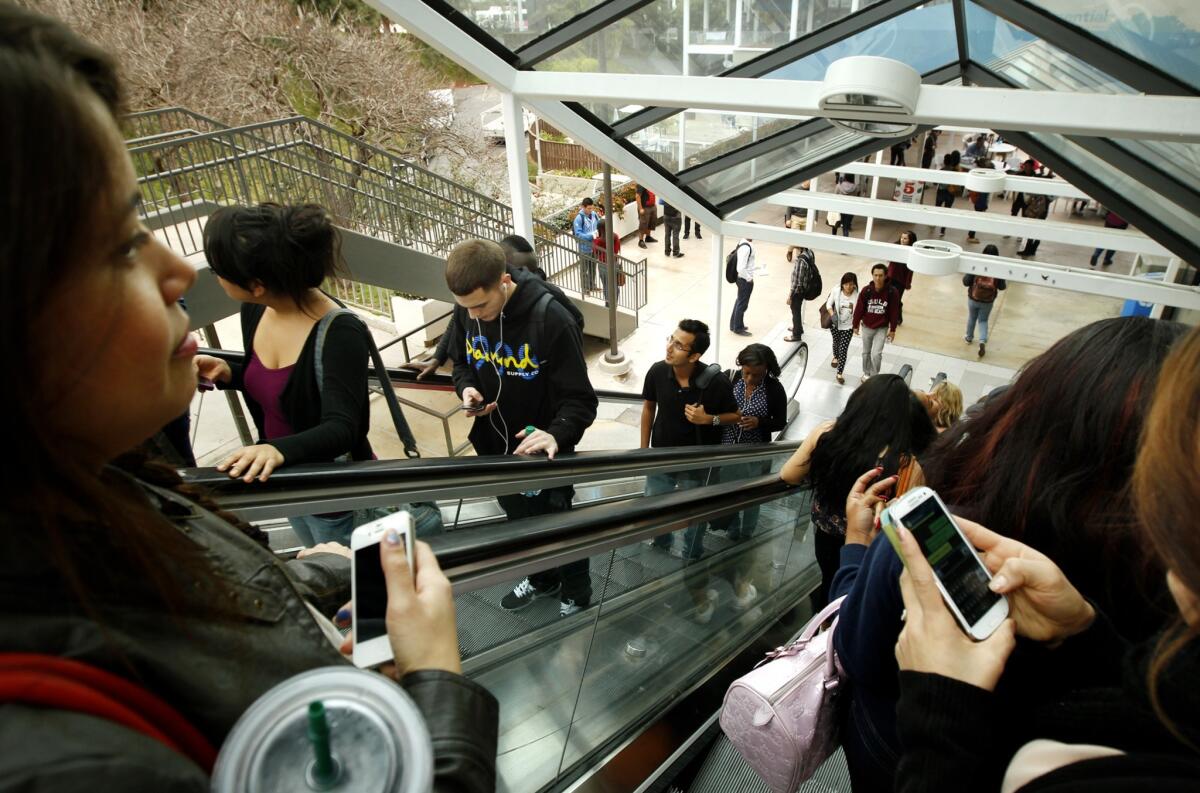Cost, financial aid becoming more important in college choice

- Share via
Rising college costs are weighing more heavily on students, with increasing numbers rejecting their first choice and opting instead for the school offering a solid financial aid package, according to a UCLA survey released Wednesday.
Freshmen who indicated that education costs were a “very important” factor in their college choice reached a record high of 46% -- up nearly 15 percentage points since 2004, according to the survey of the nation’s first-year students conducted by UCLA’s Higher Education Research Institute.
Only 57% of students enrolled in their first-choice campus in 2013, the lowest level since the item was first measured in 1974. Meanwhile, nearly 49% of students said that a financial aid offer was “very important” consideration in choosing their current campus -- up from 34% in 2004.
“Costs and financial aid are becoming more important and salient to students’ decisions in part due to increased tuition,” said Kevin Eagan, interim director of UCLA’s Cooperative Institutional Research Program, which prepares the survey. “Tuition has increased particularly at public institutions.”
In California, for example, tuition and fees increased 91% at California State University and 74% at the University of California from 2006, according to a recent report by the nonprofit California Budget Project.
Students are also more aware of rising college debt -- $1.2 trillion nationally -- and are more wary of being saddled with huge loans to repay.
“Students are approaching their college search with a much more critical eye on how they’re going to fund their education,” Eagan said.
The survey found financial considerations were even more important for students who are the first in their family to attend college, with 60% citing financial aid as a “very important” consideration in their choice.
“First-generation students do not want to create a financial burden for their families, who know less about the complex financial aid forms [and] details of loans and tax credit benefits, which do not ease the burden of initial out-of-pocket costs,” Sylvia Hurtado, director of the research institute, said in a statement.
Cost calculations are reflected in increasing requests for financial aid, many college officials said.
At Cal State Long Beach, the percentage of undergraduates receiving federal Pell grants for low-income students increased to nearly 50% last fall, compared to 36% in 2009.
“We’re seeing increasing numbers of students designated as low-income and it had to do with the growing inequality of wealth and income in the U.S., with increasing numbers of young people living in poverty,” said David Dowell, Cal State Long Beach’s interim provost.
The Long Beach campus received more than 83,500 undergraduate applications for fall 2014, among the highest count in the nation. While some of those students may choose to attend other four-year schools or community colleges because of costs, “We will get a fair number of students who can’t afford UC,” Dowell said.
Kristine Kerobyan, a Long Beach freshman, said she decided against her first-choice campus of Cal State San Diego after considering the costs to live on campus and spend weekends with her family in Los Angeles.
She was also admitted to a number of UC campuses, including Irvine, but ruled out that school also because of costs.
“The Irvine campus was beautiful but I’m a business major and I didn’t want to spend an extra $20,000 to get the same education I could get somewhere else,” Kerobyan, 18, said.
She said she was also swayed by the Long Beach financial aid package, which left her having to pay only $44 out-of-pocket last semester for tuition, fees, books and other costs.
Requests for financial aid also have increased at Pomona College, the private Claremont campus where annual tuition tops $43,000. The school has a need-blind admission process and financial aid packages do not include loans.
Prioritization of financial aid and cost over other historical considerations such as academic reputation and graduates’ job prospects has been growing, said Seth Allen, vice president and dean of admissions and financial aid at Pomona.
“The idea of investment has moved from the education experience and thinking and problem-solving skills to a more practical orientation of what career will this prepare me for,” Allen said.
The survey, conducted since 1966, is considered the most comprehensive assessment of college student attitudes. The 2013 report is based on responses of 165,743 first-time, full-time freshmen at 234 four-year colleges and universities around the country.
A somewhat surprising outcome was students’ views of online education, which has been an increasing focus of efforts to save costs and increase access in California and elsewhere.
Nearly 42% of students said they used online instruction for a class in their final year of high school, but mostly to learn something on their own.
Only 6.5% of students said they were likely to enroll in an online course will attending their college institution.
The responses may indicate a “disconnect” between students’ expectations and the drive to integrate more Massive Open Online Courses -- or MOOCs -- and other online technologies.
“Online is not played up in what students see in films and television, where they see a more traditional college campus with faculty and students face-to-face,” Eagan said.
It may be, he said, that as “they have difficulty getting the classes they need ... their openness to online courses changes as they understand the greater flexibility offered.”
Twitter: CarlaRiveralat
More to Read
Sign up for Essential California
The most important California stories and recommendations in your inbox every morning.
You may occasionally receive promotional content from the Los Angeles Times.














